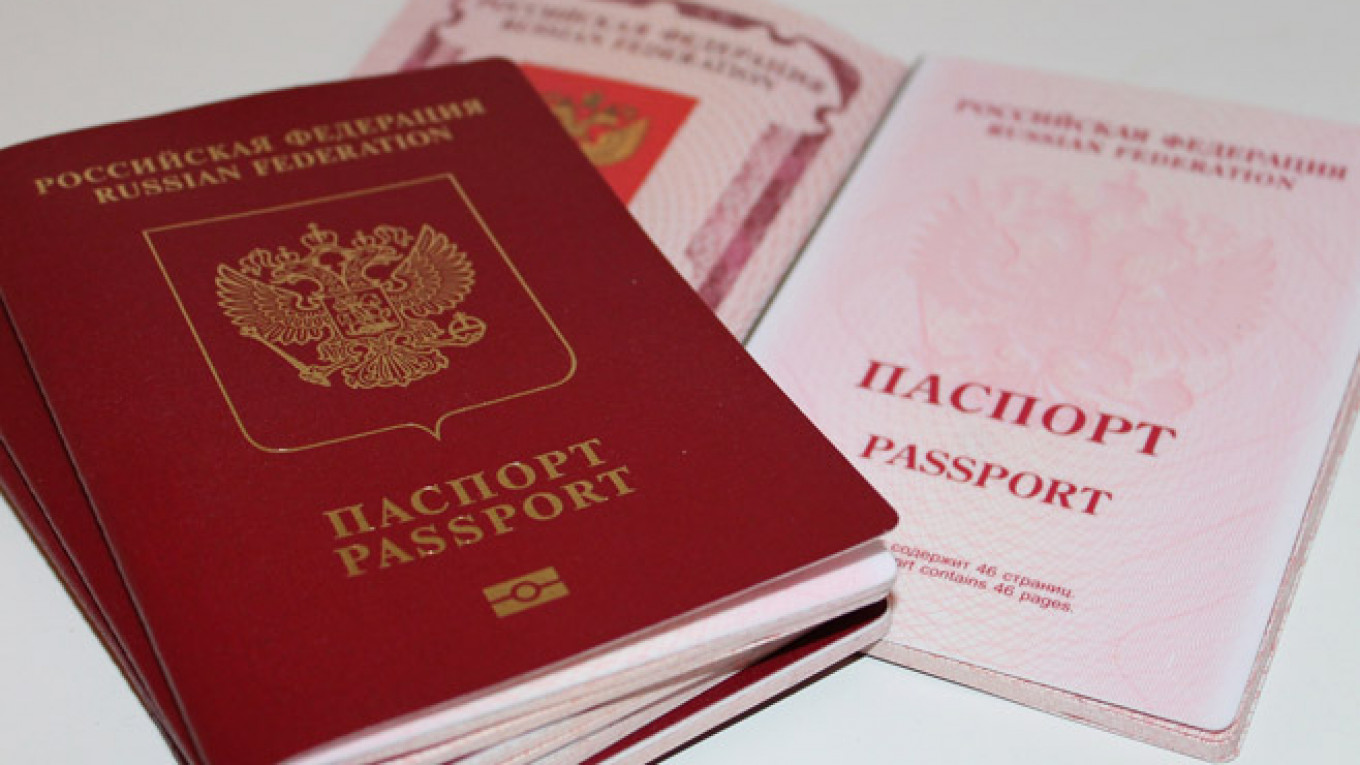Russia is about to criminalize failure to declare dual citizenship in what lawmakers say is a bid to crack down on the "fifth column" — and the fifth column is duly scared.
Exposing holders of multiple passports may be the first step to banning dual citizenship, said a holder of U.S. and Russian passports who currently lives on the U.S.' east coast.
"I am just afraid I will not be able to see my friends and family," she said. She asked for her name to be withheld from print for fear of getting into trouble with the Russian bureaucracy.
A bill fast-tracked by the State Duma makes not reporting another citizenship to migration authorities punishable with a fine of up to 200,000 rubles ($5,800) or up to 400 hours of community service.
The bill's authors say it is a preemptive measure against possible subversive action by dissidents in the face of Moscow's deteriorating relations with the West.
But the legislation is borderline unconstitutional and discriminative, targeting thousands of politically uninvolved citizens in a fit of state paranoia straight out of Soviet textbooks, the bill's critics say.
"This is just the state meddling in personal affairs through laws widely seen as repressive," said Svetlana Gannushkina of rights group Memorial.
Presidential Approval
Holders of multiple citizenships found themselves in the legislative crosshairs in March, when the idea of tracking them was endorsed by President Vladimir Putin.
"We have the right and a need to know who is living in Russia and what they do here," Putin said at the time.
The bill on the issue was rapidly penned by Andrei Lugovoi of pro-Kremlin nationalists LDPR, a former Kremlin guard who earned notoriety in the West when he was fingered as the main suspect in the polonium poisoning of KGB defector and Putin critic Alexander Litvinenko in London in 2006. Lugovoi denied involvement.
The bill breezed through both houses of parliament within six weeks and is pending a presidential signature.
Constitution and Discrimination
Lugovoi's bill is replete with questionable legal nuances, said Alexander Zakharov, a partner at law firm Paragon Advice Group.
Holding a foreign passport is legal in Russia, according to the constitution, but the draft law implies that it can be an offense, Zakharov said by telephone Wednesday.
Article 6 of the Constitution, which covers dual citizenship, contains no bans and says only that Russians with foreign passports are viewed domestically as Russian citizens.
Lugovoi's bill also discriminates against certain groups of citizens, said opposition lawmaker Dmitry Gudkov, who opposed the legislation.
Under the law, only people who live in Russia have to declare their second passport to the authorities, while passport holders permanently residing outside the country are exempt from it.
Foreign Agents Among Us
The bill's authors do not deny that the law is politically motivated.
Lugovoi did not return a request for comment from The Moscow Times, but cites on his website the West-endorsed fifth column among the liberals as the law's target.
"Russia's enemies are constantly looking for weak spots in our ranks," Lugovoi said in a post in April. He said the government's critics are seeking to disrupt normal life in Russia, possibly supported or guided by the West.
The Kremlin has mounted a crackdown on political opponents following mass opposition protests from 2011 to 2013 targeting opposition leaders and independent NGOs.
Special attention has been given to foreign affiliation: NGOs involved in vaguely defined "political activity" that receive foreign funding have been forcibly labeled "foreign agents," a derogative tag from Soviet times.
Isolationism is also on the rise: Officials and legislators have been banned from owing assets — though not real estate — outside the country, and foreign travel has been prohibited for some 4 million civil servants out of a total population of 143 million.
"The trend today is toward repressive legislation," said Gannushkina of Memorial, a prominent NGO that was also ruled a "foreign agent."
Disloyal by Default?
The problem is that there is no proof that the majority of foreign passport holders are in any way disloyal to Russia, Gannushkina said.
"These people are suspected of disloyalty by default," she said.
Even Lugovoi conceded dual citizenship holders are more likely to be businessmen than political activists, though he still insisted obtaining a foreign passport was a "betrayal of national interests."
There may be rather a lot of traitors around, however. Russia only has dual citizenship agreements, under which both countries recognize both a person's nationalities, with two countries — Turkmenistan and Tajikistan — but Russians appear to hold passports across the United Nations membership roster. No comprehensive statistics exist, but in a telling example, Finnish authorities reported 21,000 Russian-Finnish passport holders as of 2013. When there is no dual citizenship agreement in place, each country regards the holder solely as a citizen of their state.
The Federal Migration Service said 73,000 Russians received foreign passports in 2013-2014, though it gave no breakdown by country. The Russophone diaspora is estimated at up to 30 million worldwide, including more than 3 million in the U.S. and up to 2 million in Germany, though it is unclear how many have Russian citizenship.
Russia's current rules on the issue are softer than in many countries, including Japan, India, the Netherlands and Ukraine, where dual citizenship is banned under all or most circumstances. Having more than one passport is, however, not forbidden in the U.S, Britain, Australia, Canada and France, among others.
Armies of Traitors
The main concern expressed over the new law is that the authorities' ultimate goal is to ban dual citizenship, not just expose it.
That idea was already floated by Lugovoi, though Gudkov said it was unlikely because it would affect many in the Russian ruling elite, where sending wives and children abroad to places like Nice, France or Miami, U.S. is common practice.
But Gannushkina said it was an inevitable step, given "repressive" state policies.
Both Gannushkina and Gudkov said even the current legislation could prompt an exodus of holders of multiple passports.
That sentiment was shared by people with dual citizenship interviewed by The Moscow Times, none of whom professed to political activity.
"I still love Russia. Sh*t happens here, but there is also a lot of amazing things about the country," said Alina, a British-Russian citizen working for a foreign company in Moscow who asked that her name be changed to protect her identity.
But she said she would prefer to avoid declaring her second passport and would not rule out moving abroad in order to do so.
The situation reminded her of political pressure along Soviet templates, something she wants nothing to do with, Alina said.
"At some point you just realize your country is not quite yours anymore," she said.
Contact the author at a.eremenko@imedia.ru
A Message from The Moscow Times:
Dear readers,
We are facing unprecedented challenges. Russia's Prosecutor General's Office has designated The Moscow Times as an "undesirable" organization, criminalizing our work and putting our staff at risk of prosecution. This follows our earlier unjust labeling as a "foreign agent."
These actions are direct attempts to silence independent journalism in Russia. The authorities claim our work "discredits the decisions of the Russian leadership." We see things differently: we strive to provide accurate, unbiased reporting on Russia.
We, the journalists of The Moscow Times, refuse to be silenced. But to continue our work, we need your help.
Your support, no matter how small, makes a world of difference. If you can, please support us monthly starting from just $2. It's quick to set up, and every contribution makes a significant impact.
By supporting The Moscow Times, you're defending open, independent journalism in the face of repression. Thank you for standing with us.
Remind me later.







